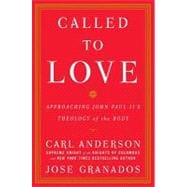
Note: Supplemental materials are not guaranteed with Rental or Used book purchases.
Purchase Benefits
What is included with this book?
CARL ANDERSON, New York Times bestselling author, is the chief executive officer and chairman of the board of the Knights of Columbus. He held various positions of the Executive Office of the President from 1983 to 1987, was a member of the U.S. Commission on Civil Rights, and has taught at the Pontifical Institute for Studies on Marriage and Family in Rome. FR. JOSE GRANADOS is Assistant Professor of Patrology and Sytematic Theology at the Pontifical John Paul II Institute for Studies on Marriage and Family at the Catholic University of America in Washington, D.C.
| Preface | p. vii |
| Abbreviations | p. xi |
| Introduction | p. 1 |
| Encountering Love: The Experience of The Body And The Revelation of Love | |
| The Body Manifests The Person | p. 19 |
| Sexual Difference: The Vocation to Love | p. 39 |
| The Nuptial Mystery: From The Original Gift To The Gift of Self | p. 61 |
| The Communion of Persons As An Image of The Trinity | p. 80 |
| The Redemption of The Heart | |
| A Wounded Heart: The Fragility of Love | p. 101 |
| Christ: The Redeemer of The Heart And The Fullness of Love | p. 125 |
| Maturing In The Fullness of Love | p. 145 |
| The Beauty of Love: The Splendor of the Body | |
| Loving with the Love of Christ: The Sacrament of Marriage | p. 167 |
| Witnessing To The Fullness of Love: Christian Virginity And The Destiny of The Body | p. 199 |
| The Family and The Civilization of Love | p. 226 |
| Notes | p. 245 |
| Bibliography | p. 257 |
| Table of Contents provided by Ingram. All Rights Reserved. |
The New copy of this book will include any supplemental materials advertised. Please check the title of the book to determine if it should include any access cards, study guides, lab manuals, CDs, etc.
The Used, Rental and eBook copies of this book are not guaranteed to include any supplemental materials. Typically, only the book itself is included. This is true even if the title states it includes any access cards, study guides, lab manuals, CDs, etc.
Excerpted from Called to Love: Approaching John Paul II's Theology of the Body by Carl Anderson, Jose Granados
All rights reserved by the original copyright owners. Excerpts are provided for display purposes only and may not be reproduced, reprinted or distributed without the written permission of the publisher.